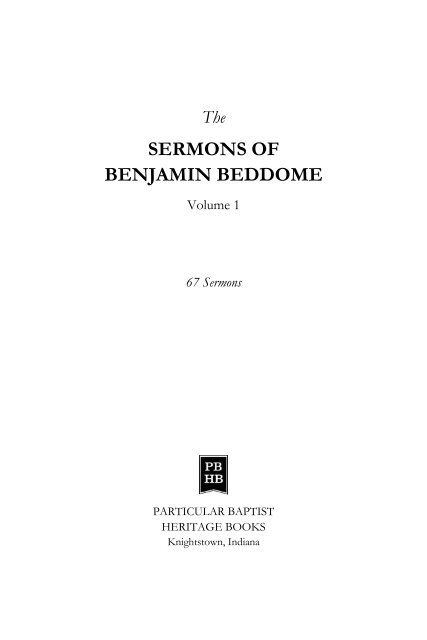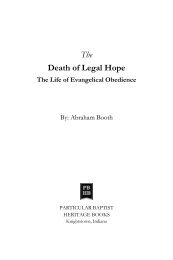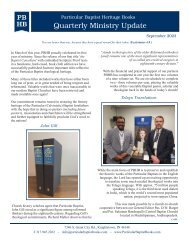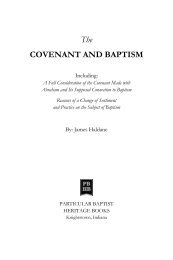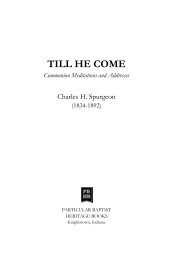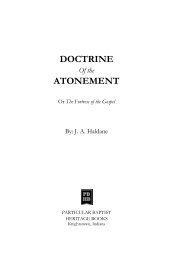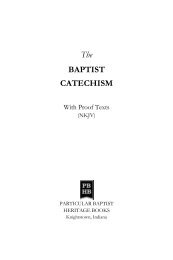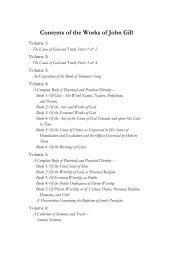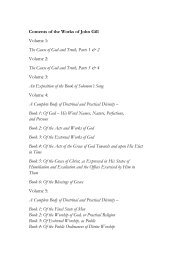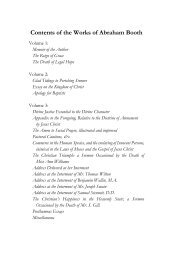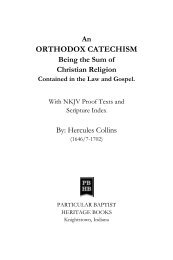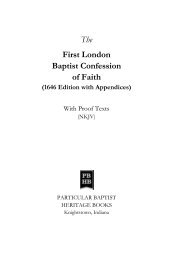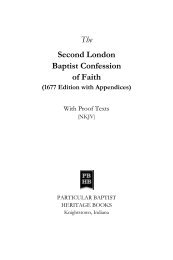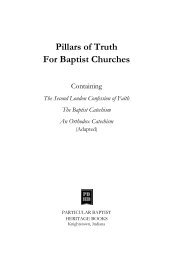Beddome's Sermons Vol.1
A word for word republication of: Sermons Printed from the manuscripts of the late Rev. Benjamin Beddome, A.M with a brief Memoir of the Author. (London: William Ball, 1835).
A word for word republication of:
Sermons Printed from the manuscripts of the late Rev. Benjamin Beddome, A.M with a brief Memoir of the Author. (London: William Ball, 1835).
You also want an ePaper? Increase the reach of your titles
YUMPU automatically turns print PDFs into web optimized ePapers that Google loves.
The<br />
SERMONS OF<br />
BENJAMIN BEDDOME<br />
Volume 1<br />
67 <strong>Sermons</strong><br />
PARTICULAR BAPTIST<br />
HERITAGE BOOKS<br />
Knightstown, Indiana
The <strong>Sermons</strong> of Benjamin Beddome – Volume 1<br />
First PBHB Edition 2022<br />
Particular Baptist Heritage Books<br />
7346 S. Grant City Rd.<br />
Knightstown, IN 46148<br />
email: info@particularbaptistbooks.com<br />
website: www.ParticularBaptistBooks.com<br />
PBHB is committed to recovering and preserving the literary<br />
heritage of Particular Baptists in an attractive, heirloom quality<br />
hard-cased format.<br />
General Editor: D.W. Barger<br />
Copy Editor: A.J. Hammaker<br />
ISBN: 978-1-64127-031-1<br />
Book cloth – Hardcover<br />
Cataloging data:<br />
1. Baptists – Great Britain – <strong>Sermons</strong><br />
2. Baptists – Great Britain – History<br />
3. Particular Baptists – England<br />
Printed and bound in the U.S.A by<br />
MissionBookmakers.com
CONTENTS<br />
Publisher’s Note .......................................................................... ix<br />
Biographical Preface ................................................................... xi<br />
Original Memoir ........................................................................... 1<br />
1. Importance of Scripture Knowledge ........................ 21<br />
Luke 1:4 – That thou mightest know the certainty of those things<br />
wherein thou hast been instructed.<br />
2. On the Manifestation of God ................................... 28<br />
John 14:8 – Philip saith unto him, Lord, shew us the Father, and<br />
it sufficeth us.<br />
3. On the Love of God ................................................... 34<br />
John 16:27 – For the Father himself loveth you, because ye have<br />
loved me.<br />
4. God No Respecter of Persons .................................. 42<br />
Acts 10:34 – Of a truth I perceive that God is no respecter of<br />
persons.<br />
5. On the Triumph of Mercy ......................................... 49<br />
James 2:13 – Mercy rejoiceth against judgement.<br />
6. On the Special Salvation of Believers ...................... 56<br />
1 Timothy 4:10 – Who is the Saviour of all men, specially of those<br />
that believe.<br />
7. On the Faithfulness of the Divine Being ................. 62<br />
1 Thessalonians 5:24 – Faithful is he that calleth you, who also<br />
will do it.<br />
8. On the Divine Providence ......................................... 69<br />
Proverbs 16:33 – The lot is cast into the lap; but the whole<br />
disposing thereof is of the Lord.<br />
iii
The Works of Benjamin Beddome – Volume 1<br />
9. The Rule of the Sacred Word .................................... 76<br />
Revelation 9:1 – And there was given me a reed.<br />
10. The Character of Christ and Angels Compared ...... 83<br />
Daniel 10:21 – There is none that holdeth with me in these<br />
things, but Michael your prince.<br />
11. On Rightly Seeking the Saviour ................................ 91<br />
Luke 8:23 – Thy mother and thy brethren stand without, desiring<br />
to see thee.<br />
12. On the Destruction of the Temple ........................... 98<br />
Matthew 24:2 – And Jesus said unto them, See ye not all these<br />
things? verily I say unto you, There shall not be left here one stone<br />
upon another, that shall not be thrown down.<br />
13. The Mutual Glory of Christ and His People ......... 105<br />
John 17:22 – And the glory which thou hast given me have<br />
I given unto them.<br />
14. The Value of True Wisdom ..................................... 113<br />
Proverbs 3:15 – All the things thou canst desire are not to be<br />
compared unto her.<br />
15. On the Value of the Soul .......................................... 118<br />
Psalm 35:17 – My darling from the lions.<br />
16. The Nature and Spring of the Christian’s Life ..... 126<br />
Proverbs 15:24 – The way of life is above to the wise.<br />
17. The Heavenly Calling ................................................ 134<br />
Revelation 17:14 – Called.<br />
18. Christ Manifested to the Soul .................................. 144<br />
Galatians 1:16 – To reveal his Son in me.<br />
19. On the Folly of Profession Without<br />
Forethought ............................................................... 153<br />
Luke 14:28 – Which of you, intending to build a tower, sitteth not<br />
down first, and counteth the cost, whether he have sufficient to finish<br />
it?<br />
20. The Happy Results of Repentance ......................... 160<br />
2 Corinthians 2:2 – Who is he that maketh me glad, but the<br />
same which is made sorry by me?<br />
iv
Contents<br />
21. The Duty of Imitating God ..................................... 169<br />
Ephesians 5:1 – Be ye followers of God, as dear children.<br />
22. On the Security of the Humble ............................... 177<br />
Matthew 18:14 – Even so it is not the will of your father which is<br />
in heaven, that one of these little ones should perish.<br />
23. On the Stability of the Gracious Character ........... 184<br />
Hebrews 13:9 – It is a good thing that the heart be established<br />
with grace.<br />
24. On the Work of Faith ............................................... 192<br />
John 6:29 – This is the work of God, that ye believe on him whom<br />
he hath sent.<br />
25. The Worship of the Magi ......................................... 199<br />
Matthew 2:11 – And when they were come into the house, they<br />
saw the young child with Mary his mother, and fell down and<br />
worshipped him: and when they had opened their treasures, they<br />
presented unto him gifts; gold, and frankincense, and myrrh.<br />
26. The Nature and Exercises of True Fidelity ........... 205<br />
Proverbs 20:6 – A faithful man who can find?<br />
27. The Compassion of Jesus toward the Guilty ........ 215<br />
Matthew 23:37 – O Jerusalem, thou that killest the prophets, and<br />
stonest them which are sent unto thee, how often would I have<br />
gathered thy children together, even as a hen gathereth her chickens<br />
under her wings, and ye would not!<br />
28. The Imperceptible Diffusion of Error<br />
and Truth .................................................................... 222<br />
Luke 13:21 – It is like leaven, which a woman took and hid in<br />
three measures of meal, till the whole was leavened.<br />
29. The Bitterness of Sin ................................................ 227<br />
Jeremiah 4:18 – It is bitter, it reacheth to thine heart.<br />
30. Mercy and Truth United in Justification ................. 232<br />
Proverbs 16:6 – By mercy and truth iniquity is purged.<br />
31. On the Fear of God .................................................. 239<br />
Psalm 25:14 – The secret of the Lord is with them that fear him.<br />
v
The Works of Benjamin Beddome – Volume 1<br />
32. Importance of the Grace of Christ ......................... 245<br />
Philemon 25 – The grace of our Lord Jesus Christ be with your<br />
spirit. Amen.<br />
33. Character Tried by the Word and Providence<br />
of God ........................................................................ 252<br />
Matthew 3:10 – The axe is laid to the root of the tree.<br />
34. Practical Religion More Important than<br />
Ceremonies ................................................................. 258<br />
1 Corinthians 7:19 – Circumcision is nothing, and<br />
uncircumcision is nothing, but the keeping of the commandments of<br />
God.<br />
35. Christ the Subject of Prayer ..................................... 269<br />
Psalm 72:15 – Prayer also shall be made for him continually.<br />
36. On Christian Fruitfulness ........................................ 276<br />
Proverbs 12:12 – The root of the righteous yeildeth fruit.<br />
37. The Duty of an Entire Surrender to God ............. 285<br />
Matthew 22:21 – And unto God the things that are God’s.<br />
38. On the Sources of Ministerial Delight ................... 293<br />
1 Thessalonians 2:20 – Ye are our glory and joy.<br />
39. Ministerial Subordination to Christ ........................ 303<br />
John 1:8 – He was not that light.<br />
40. Christ a Glorious Resting Place .............................. 308<br />
Isaiah 11:10 – His rest shall be glorious.<br />
41. The Evil of Departing from God ........................... 315<br />
Jeremiah 50:6 – They have forgotten their resting-place.<br />
42. The Majesty and Faithfulness of God .................... 321<br />
Nehemiah 1:5 – The terrible God that keepeth covenant.<br />
43. The Confession of True Penitence ......................... 329<br />
Daniel 9:8 – O Lord, to us belongeth confusion of face.<br />
44. The Nature and Authority of the Christian<br />
Ministry ....................................................................... 337<br />
Matthew 4:19 – I will make you fishers of men.<br />
45. On the Character and Results of Sin ...................... 346<br />
Psalm 68:6 – But the rebellious dwell in a dry land.<br />
vi
Contents<br />
46. Sin Offensive both to God and Men ..................... 354<br />
1 Thessalonians 2:15 – They please not God, and are contrary<br />
to all men.<br />
47. The Rejection of the Wicked ................................... 361<br />
Joel 3:4 – Yea, and what have ye to do with me?<br />
48. The Unity of True Believers ..................................... 365<br />
Galatians 3:28 – Ye are all one in Christ Jesus.<br />
49. The Right of Private Judgement ............................. 371<br />
Romans 14:5 – Let every man be fully persuaded in his own mind.<br />
50. On the Richness of Divine Bounty ........................ 378<br />
Psalm 23:5 – My cup runneth over.<br />
51. The Final Rejection of the Wicked ......................... 385<br />
Matthew 25:10 – And the door was shut.<br />
52. On the Duty of Ministers to Promote their<br />
People’s Joy ................................................................ 394<br />
2 Corinthians 1:24 – Not that we have dominion over your<br />
faith, but are helpers of your joy.<br />
53. The Nature and Importance of Prayer .................. 401<br />
1 Corinthians 14:15 – I will pray with the spirit, and I will pray<br />
with the understanding also.<br />
54. The Hidden Design of Christ’s Ministry ............... 409<br />
John 4:4 – He must needs go through Samaria.<br />
55. God the Supreme Disposer of Human Affairs .... 415<br />
Psalm 31:15 – My times are in thy hand.<br />
56. The Folly of Partial or Invidious Comparisons ..... 421<br />
2 Corinthians 10:12 – But they, measuring themselves by<br />
themselves, and comparing themselves among themselves, are not<br />
wise.<br />
57. The Danger and Sin of Idolatry .............................. 428<br />
John 5:21 – Little children, keep yourselves from idols.<br />
58. Communion with God our Security and Bliss ...... 438<br />
Psalm 69:18 – Draw nigh unto my soul.<br />
59. The Reciprocal Duties of Friends ........................... 446<br />
Proverbs 18:24 – A man that hath friends must show himself<br />
friendly.<br />
vii
The Works of Benjamin Beddome – Volume 1<br />
60. The Similar Condition of Christ and His<br />
Followers .................................................................... 452<br />
1 John 4:17 – As he is, so are we in this world.<br />
61. On the Dignity of the Christian Church ................ 458<br />
Jeremiah 3:17 – At that time they shall call Jerusalem the throne<br />
of the Lord.<br />
62. The Mystery of the Burning Bush .......................... 464<br />
Acts 7:31 – When Moses saw it he wondered at the sight.<br />
63. On the Obedience of the Heart .............................. 471<br />
Proverbs 3:1 – Let thine heart keep my commandments.<br />
64. The Sin of Rejecting What is Good ....................... 479<br />
Hosea 8:3 – Israel hath cast off the thing that is good.<br />
65. Christ the Physician of Souls ................................... 487<br />
Matthew 9:21 – She said within herself, If I may but touch his<br />
garment, I shall be whole.<br />
66. Christ the Teacher of Prayer ................................... 493<br />
Luke 11:1 – One of his disciples said unto him, Lord, teach us to<br />
pray, as John as taught his disciples.<br />
67. A Funeral Sermon (Preached at Warwick) ............ 498<br />
Hebrews 2:15 – And deliver them who through fear of death were<br />
all their life-time subject to bondage.<br />
viii
Publisher’s Note<br />
It is our privilege to republish the sermons of eighteenth-century<br />
Particular Baptist minister, Benjamin Beddome (1717 – 1795).<br />
When completed, this new multi-volume set will contain a total<br />
of 225 sermons originally published during the years 1807 – 1835.<br />
The present edition, the first in the series, contains 67 sermons.<br />
It is a republication of <strong>Sermons</strong> Printed from the manuscripts of the late<br />
Rev. Benjamin Beddome, A.M. with a Brief Memoir of the Author<br />
(London: William Ball, 1835).<br />
Future volumes will include an additional 158 sermons originally<br />
published as eight separate volumes under the title: Twenty Short<br />
Discourses adapted to Village Worship or the Devotion of the Family.<br />
Beddome’s <strong>Sermons</strong> reflect a conviction that the Scriptures are the<br />
pure and infallible Word of God. Upon reading his sermons it<br />
becomes patently obvious that this conviction commanded all his<br />
focus and thinking during sermon preparation. His arrangements<br />
are simple, yet textually insightful. His outlines are not forced, but<br />
form a natural contour, following the theme of the text. His<br />
expositions are careful, clear and profound.<br />
Beddome’s <strong>Sermons</strong> also reflect that, after the Bible, the main<br />
influences upon his sermons were the Reformed and Puritan<br />
writers of the seventeenth-century. In 1752 Beddome published<br />
a Scriptural Exposition of what would later become known as The<br />
Baptist Catechism (1693). Like C. H. Spurgeon, Beddome’s <strong>Sermons</strong><br />
reveal Beddome to be a theological heir of those English<br />
Protestant orthodox writers and Puritans who belonged to the<br />
Reformed confessional tradition.<br />
These sermons also reveal Benjamin Beddome to be an eminent<br />
Particular Baptist preacher, theologian, and exegete. Students of<br />
God’s Word would be served well by reading them. Ministers of<br />
God’s Word would be served by observing Beddome’s abilities in<br />
the areas of observation, assimilation of biblical data, and<br />
creativity.<br />
ix
It is hoped that this series will reintroduce many of today’s<br />
Calvinistic Baptists to Beddome and also the literary heritage of<br />
their notable and largely forgotten forefathers, the Particular<br />
Baptists.<br />
Their written works were both spiritually rooted and theologically<br />
driven. They offer not only penetrating insights into God’s Word,<br />
but also a deep spirit of devotion to Christ.<br />
Our team works hard to provide the reader with unabridged,<br />
word-for-word renditions of these valuable works in new and<br />
durable formats. This means keeping the original spellings,<br />
punctuations, and sentence structures of the originals even as we<br />
employ modern fonts and book binding techniques.<br />
For clarity, we also wish to inform our readers that our publishing<br />
of an author’s works does not necessarily entail a complete<br />
endorsement of every doctrinal point held by that author. Our<br />
goal is to give our readers access to Particular Baptist sources<br />
which will edify the Church and continue the work of Baptist<br />
historiography, not to stifle our heritage in the hope of<br />
strengthening present convictions.<br />
Among the many pressing needs of Calvinistic Baptist churches<br />
today is the need to identify, recover, and preserve their rich<br />
literary heritage.<br />
If you agree, there is a way for you to help. Our publishing<br />
ministry depends heavily upon financial partners eager to<br />
subsidize the cost of republishing these valuable works.<br />
Will you prayerfully consider becoming a publishing partner?<br />
To do so, visit our website: www.ParticularBaptistBooks.com<br />
Finally, we would like to express our gratitude to David Luke<br />
(Prof. Historical Theology, Irish Baptist College) for contributing<br />
the Biographical Preface. Also, special thanks to Rev. Ron Miller<br />
of Covenant Baptist Church (Clarksville, TN) for loaning us his<br />
editions of Beddome’s Twenty Short Discourses adapted to Village<br />
Worship or the Devotion of the Family. Lastly, we extend our thanks<br />
to Rev. T. D. Hale for the digital color portrait of Beddome.<br />
x
BIOGRAPHICAL PREFACE<br />
THE LIFE AND TIMES OF<br />
BENJAMIN BEDDOME<br />
(1717–1795)<br />
The Cotswolds in England is an area of outstanding natural<br />
beauty. With its quaint rural landscape and distinctive stone<br />
buildings, it speaks of the country in an age gone by and is<br />
today a popular tourist destination. One of the most visited<br />
villages in the region is the picturesque Bourton-on-the-Water,<br />
which exhibits evidence of a settlement dating back to the<br />
Neolithic age and a church from the eighth century. Beginning<br />
in the seventeenth century, a series of five bridges were<br />
constructed in the village leading to it being dubbed ‘the<br />
Venice of the Cotswolds.’ Looking at this idyllic village today<br />
it is, perhaps, hard to imagine that it was once the scene of a<br />
powerful movement of the Holy Spirit when God worked<br />
through the life and ministry of Benjamin Beddome. Although<br />
now largely forgotten, Beddome was a well-known and much<br />
admired Particular Baptist minister. Contemporaries regarded<br />
him as being on a par with figures who are more widely known<br />
today, such as John Ryland, Abraham Booth and Andrew<br />
Fuller.<br />
Particular Baptist Life in the Early Eighteenth Century<br />
In the early decades of the eighteenth century, English<br />
Particular Baptist churches faced three key issues. In the first<br />
instance, the latter decades of the seventeenth century had<br />
been extremely difficult for Baptists. With the restoration of<br />
1
The Works of Benjamin Beddome – Volume 1<br />
the monarchy under King Charles II in 1660, the Church of<br />
England was also restored to its pre-Civil War form as the<br />
established church of the realm. Alongside this, a range of laws<br />
was introduced that placed Dissenters (those such as Baptists<br />
who refused to conform to the Church of England) at legal<br />
and social disadvantages. The zeal with which these laws were<br />
implemented varied across place and time, and ranged from<br />
outright persecution, such as imprisonment, to various forms<br />
of social discrimination. Eventually, with the death of Charles<br />
II, the dethronement of James II, and the accession of William<br />
and Mary, Dissenters were granted a measure of relief with the<br />
passing of the 1689 Toleration Act. They could now practice<br />
their religion legally, but many of their disabilities remained<br />
until long into the nineteenth century. They also continued to<br />
face much popular hostility. For example, in some places<br />
outdoor baptisms took place in the early hours of the morning<br />
to avoid violent attacks. The consequence of this difficult<br />
period of almost thirty years of struggle was that many Baptists<br />
entered the eighteenth century exhausted and in poor spiritual<br />
condition.<br />
A second issue was that many Dissenters began to embrace<br />
unitarian beliefs. In the seventeenth century Socinianism, with<br />
its Arian convictions, had emerged in England, but it was<br />
outlawed and gained little support. By the end of the century,<br />
however, Socinianism became more acceptable as some<br />
influential intellectual figures turned towards the rationalism<br />
associated with Deism. Among those who embraced rational<br />
religion were many Dissenters and, during the eighteenth<br />
century, their congregations became unitarian in their theology.<br />
This was a great problem among General Baptists and their<br />
churches all but collapsed over the course of the century. The<br />
debates also affected some Particular Baptist churches, and, for<br />
2
Original Memoir<br />
a time, it was unclear which way they would go. In the end,<br />
they remained firmly Trinitarian, although the challenge of<br />
rational religion remained.<br />
The third concern among Particular Baptists was related to<br />
High Calvinism. In the seventeenth century, Particular Baptists<br />
had rejected the idea of virtual justification, meaning that<br />
believers were justified, reconciled, and adopted on the day<br />
Christ died. As a result, when a person was converted it was<br />
simply the Holy Spirit assuring them in time of what had<br />
occurred in eternity. By the 1720s this way of thinking was<br />
gaining support among some Particular Baptists who wished<br />
to keep a high view of God’s sovereignty in the matter of<br />
salvation. As a result, many Baptists began to spurn the idea<br />
that they should engage in ‘moral persuasion’ when preaching<br />
the gospel, or that they should call upon sinners to repent and<br />
put their faith in Christ. High Calvinism came to be associated<br />
particularly with John Gill, who was known as a staunch<br />
defender of Trinitarian orthodoxy and was the leading<br />
Particular Baptist and Dissenting minister of the day. This<br />
theological outlook had a deadening effect on many Baptist<br />
churches and robbed them of their evangelistic thrust which<br />
led in some areas to a significant decline.<br />
These were the great issues of the age among Particular<br />
Baptists. Yet, it is difficult to generalize about them, and the<br />
degree to which they affected Baptist churches varied from<br />
region to region. Some churches largely avoided persecution,<br />
were not influenced by Arianism, and did not struggle with<br />
High Calvinism. Some churches continued in the eighteenth<br />
century to enjoy a lively, orthodox, Evangelical Calvinism that<br />
bore much fruit. It was among such churches that John<br />
Beddome came to faith.<br />
3
The Works of Benjamin Beddome – Volume 1<br />
Background and Early Years<br />
John Beddome was born into a Dissenting home and later<br />
joined the congregation of Benjamin Keach in Horsley Down,<br />
London. Keach was one of the most influential figures in<br />
shaping the Particular Baptist movement in Post-Restoration<br />
England. It was while a member of this congregation that John<br />
was called to the ministry by the church and was appointed as<br />
assistant minister in Alcester Baptist Church, a few miles from<br />
Stratford-Upon-Avon. Here, like many other Dissenting<br />
ministers of the day, he founded a school to support himself.<br />
Within a few years, two new Baptist churches were established<br />
in nearby towns and, in 1705 when the minister died, Beddome<br />
became responsible for all three churches. As was common<br />
practice at the time, he served a probationary period, and he<br />
was not called as minister until around 1711.<br />
Soon he was joined in the work at Alcester by Bernard<br />
Foskett, who probably acted as his assistant. It was the<br />
beginning of a lifelong friendship and association in the work<br />
of the gospel which led to their relationship being described as<br />
like that of David and Jonathan. Over the next thirteen years,<br />
they conducted a fruitful ministry, with many converts and<br />
people being baptized and added to the churches. They also<br />
reorganized the three churches in their charge and reconnected<br />
with the Midland Association of Baptist churches. In 1719<br />
Foskett was called to be assistant minister at Broadmead<br />
Baptist Church, Bristol, and to the role of tutor at Bristol<br />
Baptist Academy. The great port of Bristol was then England’s<br />
second city, and Broadmead was at the heart of a thriving<br />
Baptist scene. In 1724 Beddome followed Foskett to Bristol<br />
and became an assistant at Pithay, the oldest Baptist church in<br />
the city. Cont…<br />
4
SERMONS<br />
PRINTED FROM THE MANUSCRIPTS<br />
OF THE LATE<br />
REV. BENJAMIN BEDDOME, A.M.<br />
OF BOURTON-ON-THE-WATER,<br />
GLOUCESTERSHIRE;<br />
WITH A<br />
BRIEF MEMOIR OF THE AUTHOR.<br />
LONDON;–WILLIAM BALL,<br />
ALDINE CHAMBERS,<br />
13, PATERNOSTER ROW.<br />
1835.
SERMON 1<br />
IMPORTANCE OF SCRIPTURE KNOWLEDGE<br />
Luke 1:4<br />
That thou mightest know the certainty of those things<br />
wherein thou hast been instructed.<br />
THREE observations naturally arise from these words: that<br />
there are some things in which all real converts have been<br />
instructed; that the certain knowledge of these things may yet<br />
be wanting, and is to be obtained; and that this certainty of<br />
knowledge is very desirable.<br />
OBS. I.—That there are things in which all real converts are<br />
instructed by reading, meditation, the teachings of men, but<br />
especially by the Spirit of God; and they are such things as<br />
these:—<br />
l. The nature of God, and his infinite adorable perfections;<br />
his excellent majesty, inflexible justice, unspotted purity,<br />
boundless mercy, inviolable faithfulness, and truth; what he is<br />
in himself, and what he is to his people. “He hath given us,”<br />
saith the Apostle, “an understanding to know him that is true”<br />
(1 John v. 20); by which is meant, not a speculative knowledge,<br />
which the devils have in a much greater degree of perfection<br />
than we, but that which lies in the practical judgment, and<br />
directs and governs the will and affections: thus, (Jer. xxiv. 7,)<br />
“I will give them a heart to know me, that I am the Lord: and<br />
they shall be my people, and I will be their God: for they shall<br />
return unto me with their whole heart.”<br />
2. The original corruption depravity of mankind. Of this the<br />
heathens had obscure notions: it is expressly revealed in the<br />
word, and every real penitent has been convinced of it by his<br />
7
The Works of Benjamin Beddome – Volume 1<br />
own unhappy experience. He sees that his faculties are<br />
debased, his boasted excellencies vanished, the lineaments of<br />
the Divine image obliterated, and his glory laid in the dust;<br />
groaning under a burden of guilt, and sensible of his inward<br />
pollution, he puts his mouth in the dust, and cries out, with the<br />
broken-hearted publican, “God be merciful to me, a sinner!”<br />
3. The vanity of all sublunary objects, and their utter<br />
insufficiency to satisfy the cravings of an immortal, or yield<br />
relief to a distressed, soul.—They see that we are made for<br />
nobler purposes than merely to amuse the fancy, or gratify the<br />
senses; and that to be “cumbered about many things,” whilst<br />
the “one thing needful” is neglected, is an instance of the most<br />
preposterous folly. In a word, they now see that the creatures<br />
are deceitful brooks and broken cisterns, which will ever<br />
disappoint their hopes, whilst God is the only living fountain<br />
from which their wants can be supplied.<br />
4. The extent and spirituality of the Divine law, and<br />
consequently the utter impossibility of obtaining salvation by<br />
the works of it.—They can now say with David, “We have seen<br />
an end of all perfection;” are convinced that we have it not;<br />
despair of obtaining it in this world, for “thy commandment is<br />
exceeding broad.” Their towering hopes and lofty imaginations<br />
are now levelled with the dust; and though they retain the<br />
highest regard to the law as a rule of walk and conversation,<br />
yet they have no expectation from it, nor do they place any<br />
confidence in it, as a covenant of works; they, “through the<br />
law, are dead to the law,” and their grand principle of action<br />
are changed.<br />
5. That there is salvation in no other but the Lord Jesus<br />
Christ, and that it is be obtained fully and freely through him;<br />
that his blood has procured the remission of sin; that his grace<br />
frees from the power and pollution of it, and that his<br />
righteousness is the foundation of their acceptance with God.<br />
8
Sermon 1 – Importance of Scripture Knowledge<br />
That by his obedience and sufferings justice is satisfied, the law<br />
fulfilled, the greatest honour accrues to God, and the greatest<br />
joy and happiness to man.—Thus the whole of religion is<br />
expressed by having learned Christ. God expects all from him;<br />
the sinner looks for all in him; and neither God nor the sinner<br />
shall be disappointed.<br />
6. That faith is absolutely necessary to a comfortable sense<br />
of interest in Christ, and good works the genuine evidence of<br />
it.—The enlightened sinner sees that, without faith in Christ, it<br />
is impossible either to please God or enjoy him; but then he<br />
considers this faith as an active and operative principle,<br />
productive of repentance, love, meekness, humility, purity of<br />
heart, and evangelical obedience. He considers no faith as<br />
saving but that which is sanctifying; and whilst he depends<br />
upon Christ for salvation, he yields an implicit subjection to his<br />
authority, and is careful to adorn the gospel as well as to<br />
embrace it.<br />
OBS. II.—Where persons have been instructed in the<br />
foregoing things, yet a certainty of knowledge with respect to<br />
them may be wanting, and is to obtained; for the illustration of<br />
which we may observe—<br />
l. This is not a natural, but a divine, attainment; as knowledge<br />
itself, so a certainty of knowledge is from God. Our own<br />
industry, and the efforts of others, may contribute as means,<br />
but God is the supreme author and agent. This is in Scripture<br />
especially ascribed to the Spirit, who is therefore called the<br />
Spirit of wisdom and understanding. He impresses divine<br />
truths upon the mind at first, in conversion, and opens them<br />
more fully after; shows their importance, harmony,<br />
consistency, and removes all jealousies and suspicions<br />
concerning them. One beam of light breaking in from the<br />
Spirit of God does more towards confirming and establishing<br />
the mind in the truths of religion than a thousand arguments<br />
9
The Works of Benjamin Beddome – Volume 1<br />
of the most subtle disputers. Hence we read of “the<br />
demonstration of the Spirit;” and the gospel is said to have<br />
come to the Thessalonians “in the Holy Ghost, and in much<br />
assurance.” What were doubtful opinions before, then<br />
appeared as indisputable realities.<br />
2. This is not an instantaneous, but gradual work. That<br />
illumination which takes place at a sinner’s conversion,<br />
dispelling the mists of ignorance and error from his<br />
understanding, and making him who was once darkness, light<br />
in the Lord, was instantaneous. “God said, Let there be light,<br />
and there was light;” but many fresh unctions must be received<br />
from above before he becomes a thorough proficient in the<br />
school of Christ, or attains to that certainty of knowledge<br />
which is here spoken of. Hence the path of the just is said to<br />
be like “the shining light, which shineth more and more unto<br />
the perfect day.” A touch of Christ’s hand at first so far<br />
removes our spiritual blindness, that we see men, as trees,<br />
walking; but the touch must be renewed again and again before<br />
we can see all things clearly. Hence the different degrees of<br />
knowledge among real Christians; some are rooted and built<br />
up in Christ, and established in faith, whilst others are unsettled<br />
and wavering.<br />
3. This certainty of knowledge will not be so perfect as to<br />
admit of no increase till the saints get to heaven. It is but a dim<br />
twilight that we enjoy in world; in the upper world it will be all<br />
noon-day. The moment we set our feet within the gates of the<br />
celestial city, we shall have a greater insight into things of a<br />
spiritual nature than we could attain to here by the laborious<br />
researches of many years. The faculties will be enlarged, Christ<br />
himself be our instructor, and the objects of knowledge no<br />
longer enveloped in darkness and obscurity. We shall be freed<br />
from all prejudices and passions, and the investigation of truth<br />
will be no longer attended with toil and fatigue, uneasiness and<br />
10
Sermon 1 – Importance of Scripture Knowledge<br />
pain. “Now we see but in part, and know but in part; but when<br />
that which is perfect is come, then that which is in part shall be<br />
done away.”<br />
OBS. III.—This certainty of knowledge is very desirable, and<br />
that on the following accounts:—<br />
1. Hereby our minds will be freed from doubtfulness,<br />
distraction, and many perplexing inquiries; we shall no longer<br />
be like children, carried about with every new notion, or, as the<br />
Apostle expresses it, “ever learning, and yet never coming to<br />
the knowledge of the truth.” This will be an antidote against<br />
disquietude and uneasiness, and a great deal of unnecessary<br />
trouble will be hereby prevented. Hence it is said to be “a good<br />
thing to have the heart established by grace” (Heb. xiii. 9.); and<br />
perhaps this may be the meaning of that much controverted<br />
passage, 1 Cor. ii. 15. “He that is spiritual,” that is, who hath<br />
attained to a considerable measure of spiritual light and<br />
knowledge, “judgeth,” that is, hath a clear discernment of “all<br />
things, yet he himself is judged of no man;” that is, his<br />
judgment is not determined by others; he is fully assured of the<br />
truth that holds, that their opinions weigh but little with him,<br />
nor will he be governed by them.<br />
2. This will prevent our being imposed upon by the arts and<br />
intrigues of crafty and designing men; we shall stand unmoved,<br />
like rocks in the midst of the foaming waves, resisting all their<br />
force and impetuosity; the juggling tricks, the corrupt glosses,<br />
and interpretations of those that lie in wait to deceive, will have<br />
but little influence upon one who can distinguish between truth<br />
and error, and is well settled in the principles of his holy<br />
religion. They may threaten or promise, affright or allure, but<br />
they cannot shake his faith or stagger his soul: it is true,<br />
objections may be started, and difficulties arise in his mind, but<br />
he will never renounce the important sentiments so deeply<br />
11
The Works of Benjamin Beddome – Volume 1<br />
fixed, and of which he hath both tasted the sweetness and felt<br />
the energy.<br />
3. Certainty of knowledge tends to the improvement of our<br />
graces, the increase of our comfort, and our growing<br />
fruitfulness. The more knowledge the more holiness. “Sanctify<br />
them by thy truth,” says Christ; “thy word is truth.” The more<br />
knowledge, the more liberty, both with God and for God.<br />
“The truth shall make you free.” The more knowledge, the<br />
more inward peace; the more the understanding is enlightened<br />
into the truths of the gospel, the more firmly doth the soul rest<br />
itself upon God and Christ. “I know,” says the Apostle, “in<br />
whom I have believed.” I can safely commit my eternal all into<br />
his hands, for I know that he is every way equal to his<br />
undertaking, and will faithfully discharge every trust reposed in<br />
him: in a word, the more extensive our knowledge is, the more<br />
universal will our obedience be. If the head be like the<br />
summer’s sun, full of light, the heart will not be like the winter’s<br />
earth, void of fruit; and, indeed, it is this that distinguishes<br />
between the knowledge of the hypocrite and the true believer;<br />
the one is barren and unfruitful, the other is animating and<br />
enlivening, assimilating and transforming: thus, when the<br />
Apostle prays for the Colossians, that they might be filled with<br />
the knowledge of God’s will in all wisdom and spiritual<br />
understanding; he adds, that ye might “walk worthy of God<br />
unto all pleasing.”<br />
4th, and lastly. Hereby we shall be emboldened to plead, and,<br />
if called thereto, to suffer for the truth. A man that has attained<br />
to the certain knowledge spoken of in my text, will not be silent<br />
when called to speak for God. “We cannot but speak,” says the<br />
Apostle, “the things which we have seen and heard.” Such will<br />
be ready at all times to give a reason of the hope that is in them,<br />
and be valiant for the truth, when others rage against it. They<br />
will publish it with their mouths, exemplify it in their lives, and,<br />
12
Sermon 1 – Importance of Scripture Knowledge<br />
if persecuted for their adherence to it, seal it with their blood.<br />
“They overcame by the blood of the Lamb, and by the word<br />
of their testimony, and they loved not their lives unto the<br />
death.” It was a noble saying of Dr. Taylor, when promised his<br />
life if he would renounce his wife: “That it is lawful for priests<br />
to marry,” said he, “I know is not a fundamental truth: but<br />
because I know it is the truth of God, rather than part with any<br />
truth I will part with my life.”<br />
Let all, then, be excited to seek after this certainty of<br />
knowledge; you see how desirable it is, let it be the object of<br />
your pursuit; pray for it; use the means to obtain it; and be not<br />
contented till you acquire it. This will prevent apostasy, and<br />
help perseverance, make you useful in life, comfortable in<br />
death, and then an entrance will be ministered to you<br />
abundantly the everlasting kingdom of our Lord and Saviour<br />
Jesus Christ.<br />
13


